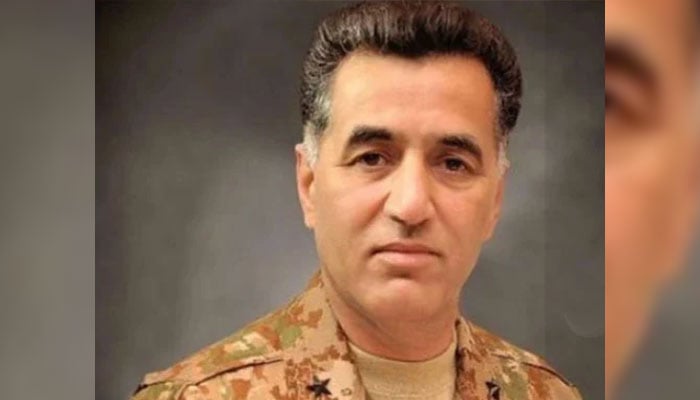Was Gen Faiz Hameed architect of TLP’s 2017 sit-in?
The commission had interviewed many individuals, including some high profile persons like the then DG (C) ISI for former ISI chief Lt Gen (retd) Faiz Hameed
ISLAMABAD: The Commission on Faizabad Dharna case has completed its probe, it is learnt.
A source associated with the three-member commission has confided to The News that the body has completed its probe and the report of its findings is ready for submission. “It will be submitted to the government and other authorities anytime,” the source said.
All the three members, it is said, have signed the report. Copies of the report are being submitted to the cabinet secretary, attorney general of Pakistan and Supreme Court registrar.
The commission had interviewed many individuals, including some high profile persons like the then DG (C) ISI for former ISI chief Lt Gen (retd) Faiz Hameed, the then prime minister Shahid Khaqan Abbasi, the then interior and defence ministers Ahsan Iqbal and Khawaja Aasif respectively and concerned senior police and civil administration officials of Rawalpindi and Islamabad.
The main question that the commission will determine is regarding the role of former ISI chief Lt Gen (retd) Faiz Hameed. The commission’s report will tell whether or not Gen Faiz Hameed was behind the Faizabad sit-in.
The commission was constituted by the government on the instruction of the Supreme Court to identify those who had planned, financed, and supported a sit-in at Islamabad’s Faizabad area six years back. Constituted in November last year, the commission was also tasked to recommend legal action against the planners and executors of the protest.
The commission was led by Syed Akhtar Ali Shah, a former civil servant, who also served as Khyber Pakhtunkhwa’s police chief. It also comprised Tahir Alam Khan, also a former police officer, and Khushal Khan, an additional secretary at the Ministry of Interior.
The commission was asked to conclude its inquiry within two months after its notification but it got two extensions to complete its task. The extension requests were granted by the apex court.
The Supreme Court had taken suo motu notice of the road blockade in November 2017 by the Tehreek-e-Labaik Pakistan (TLP). Subsequently, a division bench comprising Justice Mushir Alam and Justice Qazi Faez Isa handed down its verdict on the sit-in case, criticising the roles of intelligence agencies, Pemra, and the Election Commission of Pakistan among others.
All relevant parties in the case filed review petitions against the judgement but these petitions were not fixed for four years. After assuming the office of Chief Justice of Pakistan in September, Justice Isa took up the review petitions for hearing following which all the petitioners withdrew their review petitions. The bench then instructed the commission to investigate the motives behind filing review petitions at that time.
The Terms of References (TORs) mandated the commission to inquire into any illegal financial support to the TLP for the Faizabad sit-in and subsequent events. It was asked to recommend action against those issuing edicts or ‘fatwa’ during or in relation to the protest that either caused harm or put others in harm’s way.
The commission was also told to examine the inaction of Pemra against broadcasters and cable operators violating the law and code of conduct. It was also required to investigate the spread of hate and violence through social media, recommending measures to address it.
The TORs include fixing responsibility for any person or government officers, including those with intelligence agencies, determining violations of the law and liabilities incurred, and recommending measures for police and law enforcement agencies in handling rallies, protests, and sit-ins.
The commission was also tasked with recommending a framework for federal and provincial governments to monitor and prosecute those advocating hate, extremism, and terrorism.
-
 Sarah Ferguson Has ‘no Remorse’ Over Jeffrey Epstein Friendship
Sarah Ferguson Has ‘no Remorse’ Over Jeffrey Epstein Friendship -
 A$AP Rocky Throws Rihanna Surprise Birthday Dinner On Turning 38
A$AP Rocky Throws Rihanna Surprise Birthday Dinner On Turning 38 -
 Andrew Jokes In Hold As BAFTA Welcomes Prince William
Andrew Jokes In Hold As BAFTA Welcomes Prince William -
 Sam Levinson Donates $27K To Eric Dane Family Fund After Actor’s Death
Sam Levinson Donates $27K To Eric Dane Family Fund After Actor’s Death -
 Savannah Guthrie Mother Case: Police Block Activist Mom Group Efforts To Search For Missing Nancy Over Permission Row
Savannah Guthrie Mother Case: Police Block Activist Mom Group Efforts To Search For Missing Nancy Over Permission Row -
 Dove Cameron Calls '56 Days' Casting 'Hollywood Fever Dream'
Dove Cameron Calls '56 Days' Casting 'Hollywood Fever Dream' -
 Prince William, Kate Middleton ‘carrying Weight’ Of Reputation In Epstein Scandal
Prince William, Kate Middleton ‘carrying Weight’ Of Reputation In Epstein Scandal -
 Timothée Chalamet Compares 'Dune: Part Three' With Iconic Films 'Interstellar', 'The Dark Knight' & 'Apocalypse Now'
Timothée Chalamet Compares 'Dune: Part Three' With Iconic Films 'Interstellar', 'The Dark Knight' & 'Apocalypse Now' -
 Little Mix Star Leigh-Anne Pinnock Talks About Protecting Her Children From Social Media
Little Mix Star Leigh-Anne Pinnock Talks About Protecting Her Children From Social Media -
 Ghislaine Maxwell Is ‘fall Guy’ For Jeffrey Epstein, Claims Brother
Ghislaine Maxwell Is ‘fall Guy’ For Jeffrey Epstein, Claims Brother -
 Timothee Chalamet Rejects Fame Linked To Kardashian Reality TV World While Dating Kylie Jenner
Timothee Chalamet Rejects Fame Linked To Kardashian Reality TV World While Dating Kylie Jenner -
 Sarah Chalke Recalls Backlash To 'Roseanne' Casting
Sarah Chalke Recalls Backlash To 'Roseanne' Casting -
 Pamela Anderson, David Hasselhoff's Return To Reimagined Version Of 'Baywatch' Confirmed By Star
Pamela Anderson, David Hasselhoff's Return To Reimagined Version Of 'Baywatch' Confirmed By Star -
 Willie Colón, Salsa Legend, Dies At 75
Willie Colón, Salsa Legend, Dies At 75 -
 Prince Edward Praised After Andrew's Arrest: 'Scandal-free Brother'
Prince Edward Praised After Andrew's Arrest: 'Scandal-free Brother' -
 Shawn Levy Recalls Learning Key Comedy Tactic In 'The Pink Panther'
Shawn Levy Recalls Learning Key Comedy Tactic In 'The Pink Panther'




